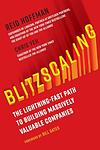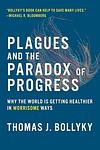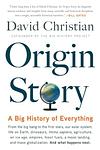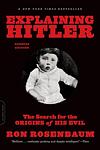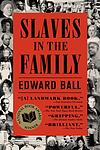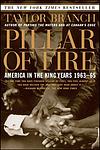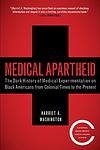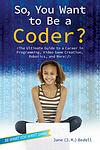The Greatest "Nonfiction" Books Since 1950
Click to learn how this list is calculated.
This list represents a comprehensive and trusted collection of the greatest books. Developed through a specialized algorithm, it brings together 300 'best of' book lists to form a definitive guide to the world's most acclaimed books. For those interested in how these books are chosen, additional details can be found on the rankings page.
Genres
Countries
Date Range
Reading Statistics
Click the button below to see how many of these books you've read!
Download
If you're interested in downloading this list as a CSV file for use in a spreadsheet application, you can easily do so by clicking the button below. Please note that to ensure a manageable file size and faster download, the CSV will include details for only the first 500 books.
Download-
1951. Blitzscaling by Reid Hoffman
This book explores the aggressive growth strategy known as "blitzscaling," which prioritizes speed over efficiency in an environment of uncertainty. It outlines how companies can scale at a dizzying pace to become market leaders, leveraging network effects and capitalizing on rapid technological changes. The strategy involves making calculated decisions that can often seem counterintuitive, such as focusing on rapid expansion over immediate profitability or perfecting the product. Through a series of case studies and insights from successful entrepreneurs, the book provides a roadmap for startups and established companies alike to dominate their markets by embracing risk, prioritizing speed, and continuously adapting to the evolving business landscape.
-
1952. Plagues And The Paradox Of Progress by Thomas J. Bollyky
This book explores the complex relationship between global health improvements and the economic and political challenges that arise as a result. It delves into how the reduction of infectious diseases has led to a longer lifespan and unprecedented population growth, but also highlights the paradox where such progress brings about new health threats and economic disparities. The narrative underscores the importance of integrating health policies with economic and social development to address these emerging challenges, advocating for a holistic approach to ensure sustainable progress. Through a blend of historical analysis, case studies, and current trends, the text presents a compelling argument for rethinking global health strategies in the face of evolving global health landscapes.
-
1953. Origin Story by David Christian
This book offers a comprehensive overview of the universe's 13.8 billion-year history, from the Big Bang to the present day, in a manner that is accessible to non-scientists. It explores the development of the cosmos, the emergence of life on Earth, and the evolution of humanity, weaving together insights from a range of disciplines including cosmology, biology, and anthropology. The narrative is structured around the concept of "Big History," aiming to provide readers with a deeper understanding of humanity's place within the vast, complex system of the universe. Through this lens, the book addresses fundamental questions about our origins, the intricate interconnections that sustain life, and the future challenges we face on a planetary scale.
-
1954. Everything Happens For A Reason by Kate Bowler
This book is a poignant memoir that delves into the life of a young historian who faces an unexpected stage IV colon cancer diagnosis. As she navigates the complexities of her illness, she examines the prosperity gospel—a belief system that suggests that fortune is a divine reward for faith and righteousness—and its impact on her understanding of suffering, faith, and the human desire to find meaning in tragedy. Through her journey, she confronts the cliché that "everything happens for a reason," offering a raw and insightful exploration of the realities of facing death, the struggle to find hope, and the quest for understanding in the midst of the inexplicable. Her narrative is a powerful reflection on faith, love, and the human capacity to endure in the face of uncertainty.
-
1955. The Perfect Weapon by David E. Sanger
This book delves into the complex and shadowy realm of cyber warfare, revealing how it has become the weapon of choice for the world's powers. Through meticulous research and interviews, it uncovers the strategies behind the United States' use of cyber capabilities for espionage and sabotage, and how these tactics are now being turned against it by adversaries. The narrative explores significant cyber incidents and their implications on national security, international relations, and the future of warfare. By highlighting the challenges of defending against invisible threats in a digital age, the book underscores the urgent need for new rules of engagement in cyberspace to prevent escalating cyber conflicts.
-
1956. Outbreak Culture by Pardis Sabeti
This book delves into the complex interplay of scientific, cultural, and organizational dynamics during epidemic outbreaks, revealing how these factors can often hinder effective response efforts. Through a detailed examination of recent global health crises, the authors argue that bureaucratic obstacles, competition for recognition, and communication breakdowns can exacerbate the spread of disease. Drawing on firsthand experiences and research, the narrative highlights the need for a more collaborative, transparent, and equitable approach in the fight against infectious diseases, advocating for systemic changes to prevent future outbreaks from spiraling out of control.
-
1957. Presidents Of War by Michael Beschloss
This book provides a comprehensive examination of American presidents who have led the nation through times of war, from the early 19th century to the modern era. It delves into the complexities of presidential power, exploring how these leaders managed the immense responsibilities of wartime command, navigated the politics of war, and made decisions that shaped the course of American history. Through meticulous research and compelling narrative, the author reveals the personal and political challenges faced by these presidents, the impact of their decisions on the battlefield and home front, and the ethical and constitutional dilemmas posed by the expansion of executive power during times of conflict.
-
1958. The Mountains of My Life by Walter Bonatti
"The Mountains of My Life" is a collection of memoirs by a renowned mountaineer, recounting his numerous adventures and expeditions to some of the world's highest and most challenging peaks. The book includes detailed accounts of his climbs, including the first winter solo ascent of the Matterhorn's north face and the first solo winter ascent of the Grandes Jorasses' north face. The narrative also delves into controversial events, such as the author's disputed role in the first ascent of K2. The book is a thrilling blend of mountaineering history, personal reflection, and breathtaking descriptions of nature's grandeur.
-
1959. The Beast In The Nursery by Adam Phillips
"The Beast in the Nursery" is a thought-provoking exploration of the themes of child development and creativity, delving into the ways in which our early experiences shape our adult perceptions and our creative impulses. The book examines the concept of the 'beast' within the context of our inner drives and fears, suggesting that our early encounters with language and desire significantly influence our later lives. Through a series of essays, the author intertwines psychoanalytic theory with literature and personal anecdotes, offering insightful reflections on how our childhood experiences continue to resonate within us, potentially stifling or fostering our creative potential.
-
1960. A Beautiful Mind by Sylvia Nasar
This biography delves into the life of a brilliant mathematician who made groundbreaking contributions to game theory, only to later struggle with schizophrenia. The narrative traces his early academic successes, his work at MIT and Princeton, his ascent into the intellectual elite, and his subsequent descent into mental illness, which threatened to overshadow his achievements. Despite the challenges posed by his condition, he eventually won the Nobel Prize in Economics, illustrating a remarkable journey of genius, adversity, and resilience. The book also explores the impact of his mental health on his personal life, particularly his relationships and family.
-
1961. There Is A World Elsewhere by F. Gonzalez-Crussi
"There Is a World Elsewhere" is a reflective exploration of the author's experiences as an immigrant, blending personal narrative with broader cultural and philosophical insights. The book delves into the complexities of identity, belonging, and the concept of home, examining how these elements are reshaped in the context of migration. Through a series of essays, the author offers a poignant and thoughtful look at the immigrant experience, interweaving his personal journey with meditations on history, literature, and the human condition, ultimately presenting a rich tapestry of what it means to live between two worlds.
-
1962. Kaddish by Leon Wieseltier
"Kaddish" is a profound exploration of grief, tradition, and spirituality, centered around the author's year-long journey of reciting the Kaddish, the Jewish prayer for the dead, following the passing of his father. The book delves deeply into the origins, history, and meaning of the prayer, while also reflecting on the broader themes of faith, identity, and the challenges of adhering to religious practice in the modern world. Through this personal and philosophical narrative, the author seeks understanding and solace in the ancient rituals of his faith, confronting his own sorrow and the complexities of the human condition.
-
1963. A History Of Molecular Biology by Michel Morange
"A History of Molecular Biology" delves into the scientific advancements and discoveries that shaped the field of molecular biology from the early 20th century to the late 1990s. The book explores the pivotal experiments, technologies, and figures that contributed to our understanding of the molecular mechanisms underlying life processes. It highlights the interdisciplinary nature of the field, drawing on contributions from genetics, biochemistry, and physics, and discusses the impact of molecular biology on related scientific areas and its implications for biotechnology and medicine. The narrative also addresses the philosophical and ethical issues raised by new biotechnological capabilities.
-
1964. Tender At The Bone by Ruth Reichl
"Tender at the Bone" is a memoir that chronicles the early life and coming-of-age of a woman who would become a renowned food critic. Through a series of humorous and poignant anecdotes, she shares how her passion for food was shaped by her experiences with family, friends, and various cultures. The narrative delves into her complex relationship with her mother, whose bipolar disorder and reckless cooking experiments left a lasting impact. The memoir beautifully intertwines the themes of love, identity, and the healing power of cooking, illustrating how food can connect us to our past, our future, and each other.
-
1965. Explaining Hitler by Ron Rosenbaum
"Explaining Hitler" is a comprehensive exploration into the various interpretations and theories surrounding Adolf Hitler's personality and the motivations behind his genocidal actions. The book delves into the debates and discussions among historians, philosophers, and writers who have attempted to understand Hitler's character and the factors that drove him to commit such atrocities. Through a series of investigative chapters, the author examines different explanations, ranging from Hitler's personal psychology to broader sociopolitical factors, and scrutinizes the moral and ethical implications of analyzing such an evil figure in history.
-
1966. Slaves In The Family by Edward Ball
"Slaves in the Family" is a non-fiction book that explores the deep and complex history of slavery in America through the personal journey of the author, who delves into his own family's past. The narrative reveals the author's ancestors were prominent slaveholders in the South, and he confronts this painful heritage by tracing the descendants of the enslaved people his family once owned. Through meticulous research and interviews, the book weaves together the stories of black and white families, uncovering the shared history and enduring impacts of slavery on both groups. The work is a profound examination of guilt, responsibility, memory, and reconciliation in the context of America's racial history.
-
1967. Pillar Of Fire by Taylor Branch
"Pillar of Fire" is the second volume in a comprehensive trilogy that explores America's civil rights struggle during the mid-20th century. This installment focuses on the period between 1963 and 1965, a pivotal time marked by profound social and political upheaval. The narrative delves into key events and figures of the era, including the rise of the Black Power movement, the Birmingham church bombing, and the leadership of Martin Luther King Jr. Through meticulous research and detailed storytelling, the book captures the intensity and emotion of the fight for civil rights, offering insights into both the major achievements and the painful setbacks of the movement.
-
1968. The Age of Surveillance Capitalism by Shoshana Zuboff
The book explores the emergence of surveillance capitalism, a new form of capitalism that thrives on personal data. The author details how tech companies, such as Google and Facebook, collect and use personal data to predict and modify human behavior as a means to produce revenue and market control. The book delves into the consequences of this phenomenon on economy, society, and democracy, warning about the dangers of unchecked data collection and manipulation.
-
1969. Hip Hop Family Tree by Ed Piskor
This graphic novel chronicles the origins and evolution of hip hop culture, exploring its roots in the Bronx during the 1970s. Through vibrant illustrations and engaging storytelling, the book delves into the lives of influential figures like DJ Kool Herc, Grandmaster Flash, and Afrika Bambaataa, showcasing their contributions to the genre and their impact on music, art, and fashion. With meticulous attention to detail, "Hip Hop Family Tree" offers a captivating and comprehensive look at the birth of a cultural phenomenon.
-
1970. Founding Brothers: The Revolutionary Generation by Joseph Ellis
The book provides an in-depth exploration of the American Revolution's aftermath, focusing on the lives of the founding fathers and the complex relationships between them. It delves into six key moments in early American history, including the duel between Aaron Burr and Alexander Hamilton, the secret dinner that determined the site of the nation's capital, George Washington's farewell address, John Adams's presidency, and the correspondence between Thomas Jefferson and Adams. The book emphasizes the crucial role of these individuals in shaping the nation's future and the profound impact of their decisions.
-
1971. Medical Apartheid by Harriet A. Washington
This book is a comprehensive history of medical experimentation on African Americans from the era of slavery to the present day. It investigates the racial disparities in healthcare and delves into the dark history of unethical and often deadly experiments conducted on black people in the United States. The author explores the roots of these practices, their implications, and the ongoing struggle for racial equality in the healthcare system.
-
1972. Boggs by Lawrence Weschler
"Boggs" is a compelling exploration of the life and work of an artist who challenges the concept of money by creating hand-drawn, detailed replicas of currency. The artist's meticulous works are not mere counterfeits, but rather pieces of art that question the value and meaning of money. The narrative delves into the artist's interactions with the legal system and the art world, examining the philosophical and legal implications of his work. Through these interactions, the book raises profound questions about art, value, and the legal structures governing currency and counterfeiting.
-
1973. Five Days In London by John Lukacs
The book provides a detailed historical account of a critical period during World War II, specifically focusing on five days in May 1940. It explores the intense political and military deliberations that took place among British leadership as they faced the dire threat of Nazi Germany. Central to the narrative is Winston Churchill's pivotal role in rallying his war cabinet and the British public to stand firm against Hitler, despite pressures to negotiate peace. The author uses a wealth of sources to reconstruct the debates and decisions that shaped the course of the war and underscored Churchill's leadership during Britain's "darkest hour."
-
1974. Memories Of The Great And The Good by Alistair Cooke
"Memories of the Great and the Good" offers a collection of insightful essays that reflect on the lives and legacies of various prominent figures from the 20th century. Through a series of vivid portraits, the book delves into the personal and professional lives of politicians, artists, and celebrities, revealing their human sides and the impacts they had on society and culture. The author, a seasoned journalist, draws from his rich experiences and encounters, providing readers with a deeper understanding of these influential individuals and the times in which they lived.
-
1975. So, You Want To Be A Coder? by Jane Bedell
This book serves as a comprehensive guide for young readers who are interested in pursuing a career in coding. It explores various aspects of the coding profession, including different types of programming languages, essential skills for success, and the wide range of career opportunities available in the field. The book also provides practical advice on how to get started with coding, featuring interviews with professionals in the industry and step-by-step projects to help beginners practice their skills. Aimed at inspiring the next generation of coders, it is an informative resource that combines educational content with engaging activities.
Reading Statistics
Click the button below to see how many of these books you've read!
Download
If you're interested in downloading this list as a CSV file for use in a spreadsheet application, you can easily do so by clicking the button below. Please note that to ensure a manageable file size and faster download, the CSV will include details for only the first 500 books.
Download